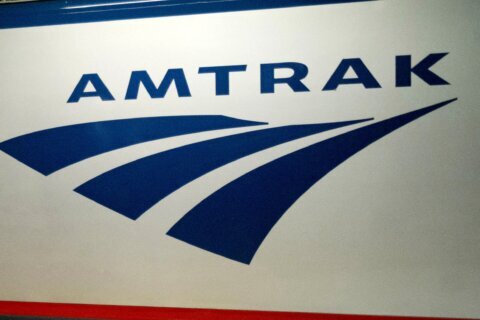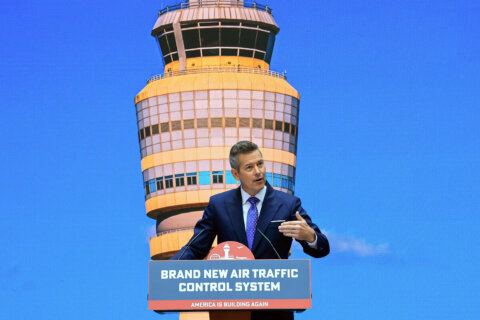ALEXANDRIA, Va. – A new way out of traffic and across the Potomac River would come sooner rather than later under a resolution approved Wednesday by Virginia’s top transportation panel.
The resolution, which received unanimous approval from the Commonwealth Transportation Board, directs Virginia Secretary of Transportation Aubrey Layne and his staff to reach out to Maryland and D.C. about new or expanded Potomac River crossings, with a particular focus on the American Legion Bridge and Metro’s Rosslyn Tunnel.
A recent Virginia study found that, compared with other crossings in the region, American Legion Bridge had the worst congestion and faced the largest projected growth. The American Legion Bridge carries the Beltway between Montgomery County, Maryland and Fairfax County, Virginia — the most populous counties in the area.
Metro’s Rosslyn Tunnel is jammed with trains on the Blue, Orange and Silver Lines. A stretch of track in the system can safely carry a maximum of 26 trains per hour when everything is running perfectly. During rush hour, riders are regularly crammed in like sardines.
Commonwealth Transportation Boardmember Gary Garczynski says he would love to see a new Legion Bridge, an expanded Rosslyn crossing for Metro, and a replacement or addition to the Harry Nice Bridge carrying U.S. 301 into Southern Maryland — in addition to a new “western crossing” somewhere between Point of Rocks and the Beltway, an idea that’s been long discussed, but never acted upon.
“If it were up to me, as a Northern Virginia District member, I’d say all four of these are worthy pursuits,” Garczynski says.
“But all of them present specific different challenges, as to whether you can fulfill actually constructing these,” Garczynski adds. “So, the start is the discussion with Maryland and with the District of Columbia to see, in partnership with them, which ones are preferable to be pursued before we start spending a whole lot of money on this study or that study.”
For context, the work to build a new Wilson Bridge on the other side of the Beltway took more than a decade. When it fully opened in 2012, the five lanes each way provided significant breathing room for drivers who had been squeezing over using three lanes in each direction.
The Virginia side of the Beltway has five lanes in each direction, if the Express Lanes are included. In order to move more people over the American Legion Bridge, Virginia transportation leaders have suggested extending the Express Lanes from their current terminus near the Dulles Toll Road to Interstate 270 in Maryland.
Maryland has not taken a position on the issue. But as Virginia leaders often point out, Maryland would have to be completely on board with any project. Virginia’s border ends at the bank of the Potomac, which means most or all of any project would be within the Free State’s borders.
Elsewhere, Maryland leaders have expressed little interest in a “western crossing” that would connect to Montgomery County’s more rural areas. Plans for improvements at the Harry Nice Bridge appear to have become much less likely since Maryland Gov. Larry Hogan cut toll rates across the state this summer, cutting into potential funding for the improvements.
All of the region’s governments have backed Metro’s plans to ease capacity issues in the core of the system, which ripple through to the ends of the lines. However, the region has not agreed on any way to fund the billions of dollars in improvements.
—
Highlights from the resolution approved Wednesday include:
- No single solution completely addresses mobility needs across the Potomac River
- The American Legion Bridge and Metro’s Rosslyn Tunnel are the most pressing needs
- The Virginia Transportation Secretary’s office is encouraged to initiate discussions with Maryland on project development for an improved Legion Bridge
- The Virginia Transportation Secretary’s office is encouraged to initiate discussions with Maryland on additional river crossings including the Harry Nice Bridge carrying U.S. 301 and the prospects of a potential Western Crossing
- The Virginia Transportation Secretary’s office is encouraged to initiate discussion with D.C. and Maryland about improvements to the Rosslyn Tunnel and Metro capacity
- Encourages business and regional groups to emphasize importance of all of this to other local leaders in the region







